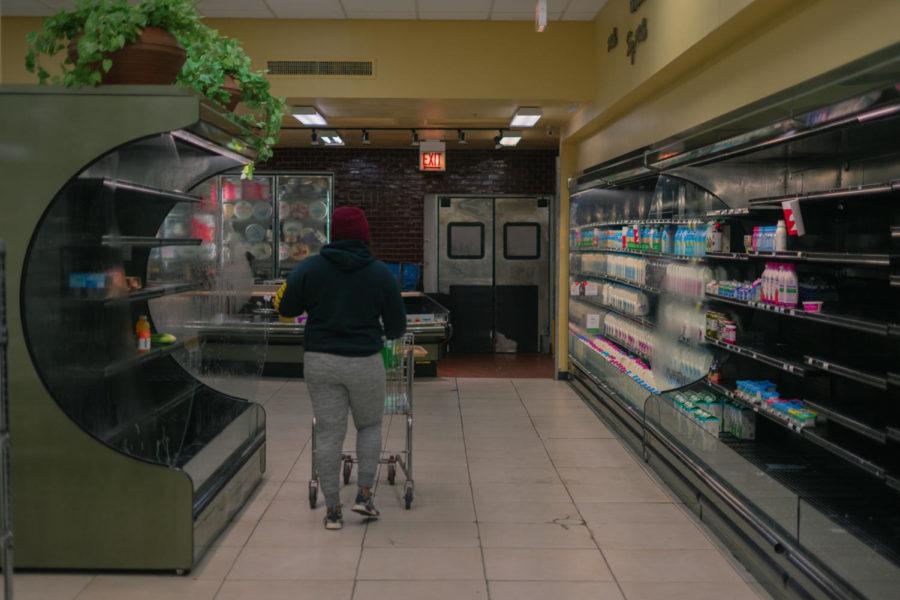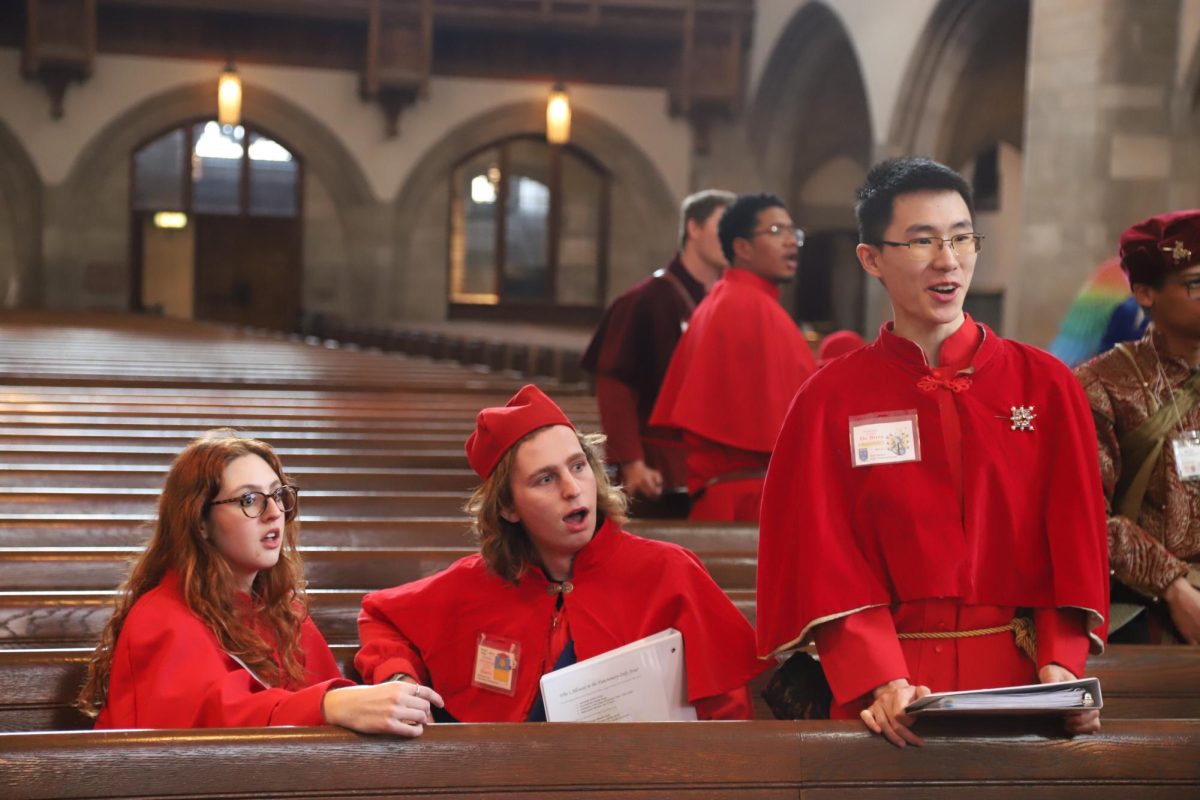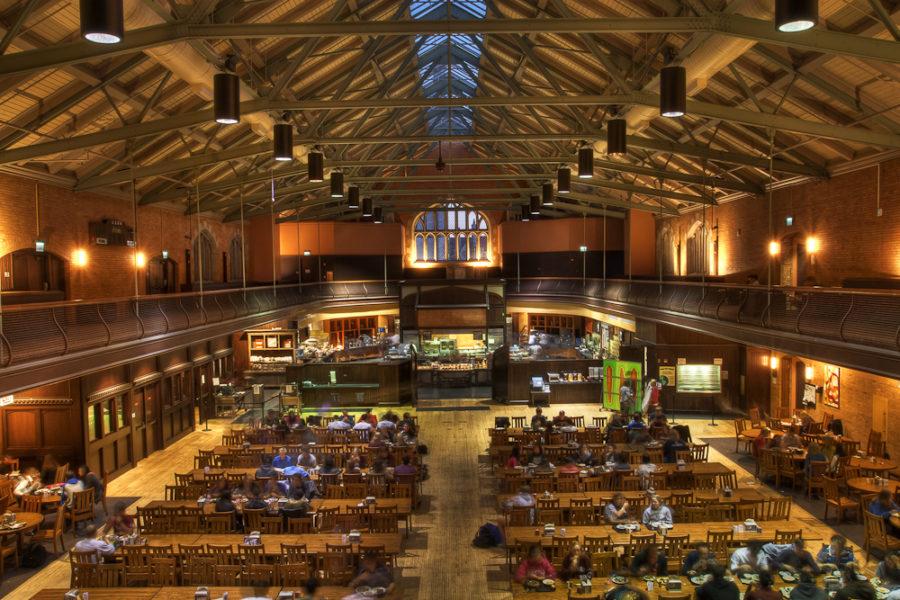It was the go-to for grape leaves, lime juice, and Velveeta in Hyde Park.
Treasure Island, a Chicago-based grocery chain that allegedly earned Julia Child’s designation as “America’s Most European Supermarket” closed on Monday, October 7, after 55 years of operation. The store carved out a niche in its wide selection of specialty and imported foods in a pre-Whole Foods (much less Amazon) era.
The brand’s closure came as a surprise to almost everyone. The University, which owns the shopping plaza where Treasure Island was located, found out it had gone out of business on the evening of September 28, just over one week before the store closed.
Today, the store sits empty and locked. A replacement vendor has not been signed, and the 450 Treasure Island employees are without work. What comes next for a neighborhood institution, closed before we had time to grieve?
A Brief History of Treasure Island
Christ Kamberos founded Treasure Island Foods in 1963 with a focus on specialty imported foods, filling a niche in Chicago’s “intensely competitive” grocery store scene.
“This is a fashion show in food,” Kamberos told the Chicago Tribune in 1982. “What we do is exciting. This business is about romance. We bring the whole world to your feet—that's romance.”
Treasure Island arrived Hyde Park in 2008 as the newest chapter in a larger Chicago story of struggling grocery stores. The Hyde Park Co-op had already vacated the site, for which the University forgave more than a million dollars in unpaid rent so that Treasure Island could take over the lease.
Outside of informing employees that TI would be going out of business, the Kamberos family has not commented publicly on the closure. Following Christ Kamberos’s death in 2009, the Kamberos family made news with an internal lawsuitin which Christ Kamberos’s daughter, Christi Matthews, accused her stepmother, Maria Kamberos, of alienating her from Christ Kamberos and deliberately decreasing Matthews’s inheritance.
Financial Symptoms
From the Hyde Park store, things looked fine. According to employees, it was the most successful of Treasure Island’s six branches. Hyde Park residents and University students would mill about, grabbing bread and boxed wine, respectively.
Recently though, the Hyde Park store’s shelves were sparse. The store director told the Hyde Park Herald that there were “delivery issues with vendors.” The store had also not been keeping its temperature logs for freezers and display cases for some time prior to the closing announcement, according to employees.
Employees also said that deliveries from suppliers like Pepsi, Frito-Lay, and American Wholesale Grocers had been inconsistent for about two months before the announcement, and that there had been no deliveries in the preceding three weeks.
The issue? Treasure Island wasn’t paying its bills.
Anthony Marano Co., a produce wholesaler, is suing the company for nearly half a million dollars in unpaid deliveries.
According to Myonna Jackson, a former bakery manager, the company had been imposing budget cuts for nearly two years. Some weeks, she said, the bakery could hardly make anything.
“They kept telling me, ‘Don’t order nothing this week.’” Jackson said. “My budget would usually be about $2,500 a week; I had to shut that down to anywhere between $800 to $1000. What can you buy with that?”
“We didn’t even have enough money to buy supplies,” fellow bakery employee Ariel Williams added. “So, if we’re making cupcakes, right, now we don’t have the containers to put the cupcakes in. Our budget for supplies was $100.”
Before announcing all the stores would close, Treasure Island quietly began closing locations.
In late August, the Kamberos family sold the parking garage next to the Boystown location for $6 million. The next week, the company closed their store in Lincoln Park. A statement called the closure a “relocation” and promised that the new store would be announced “in the coming months.”
Most employees from the Lincoln Park store were transferred to the other branches, which closed mere weeks later.
Since informing employees and creditors that the brand was shutting down, the Kamberos family has refused to speak publicly. High Ridge Partners, a financial distress management group, has taken control of TI’s assets and is searching for buyers.
Employees
Treasure Island employees received a letter on the morning of September 29, a Saturday. The note explained that it would be “impossible for [the store] to continue to operate without losing money.” Treasure Island CEO Maria Kamberos, who signed the letter, offered “heartfelt gratitude” to the employees, and wished them luck in future employment searches.
Kevin Jackson had worked at Treasure Island for over nine years. He says that he arrived to work at 6 a.m. that morning. At about 9:30 a.m., Jackson received the letter. He said his goodbyes and left soon after: “That was my last day of work. The letter stated, ‘You can stay and work your complete work day, but after today, we have no more use for you, simply put.’”
Angela Graves-Saverson had a similar story. She had heard rumors that the stores were going out of business, and those fears came true when she received her letter. Her husband said that Angela called him “almost in tears” on her lunch break after finding out.
Myonna Jackson worked in the Clybourne store before it closed. She said that she returned from a vacation, only to find out the next day that the store was closing. Jackson was transferred to the store in Old Town, just two weeks before the company announced all of its branches would be closing.
“For you to not give us any type of notice, it’s telling us you don’t care,” Jackson said. “All this patronizing about being a family and everything? You don’t treat your family like this.”
Legal Action
According to federal labor laws, employees were supposed to receive a 60-day notice of the stores’ closing, called a Worker Adjustment and Retraining Notification (WARN). Attorney Karen Engelhardt is filing a class action lawsuit against Treasure Island on behalf of the employees from all six branches of the store.
Engelhardt is also suing the company over unpaid personal time off that many employees had accrued.
“I haven’t heard not one call, nothing [from the Kamberos family]. No one contacted me,” she said at a Hyde Park community meeting earlier this week. “So it looks like we will probably have to go the way of litigation, and we’re prepared to do that.”
The United Food & Commercial Workers International Union also filed a lawsuit against the company for violating the 60-day WARN rule.
Some employees have organized with Arise Chicago, a faith-based workers’ rights activist group. Together, they organized a rallyoutside the Lakeview store earlier this week.
The Almighty Landlord
“I hope the University is doing its utmost to find a replacement for Treasure Island. That physical location is central to Hyde Park,” one resident said at the community meeting, which was attended by both University administrators and representatives from Fifth Ward Alderman Leslie Hairston’s office.
“We are,” Derek Douglas, vice president of the Office for Civic Affairs, replied. “We got you.”
The University is currently seeking a new grocery provider to rent the space. According to Douglas, the University found out Treasure Island was closing “late in the evening” on September 28, the night before employees were notified.
Because the University was “blindsided” by the announcement, they do not have another vendor lined up yet.
Angie Marks, Associate Vice President of Real Estate Operations, is responsible for choosing a replacement vendor.
She said the University will “cast a wide net” to find interested parties, but declined to provide any specific businesses they are interested in. She said that the University has already received many suggestions from residents and the Alderman’s office, and they are in the process of reaching out and identifying which might fit best with the community’s needs.
Marks did not offer any predictions for how long it would take for a new store to move in and open. “We’re going to be working aggressively every day to get it done,” she said. “We will continue to provide regular updates as we have them.”
As for the employees themselves, Hairston suggested at the forum that, when a new grocery store opens in the location, former employees should be considered for new positions. Douglas replied that many new restaurants in the area had hired employees from the establishments they replaced.
Chicago Grocery Stories
Along with Treasure Island’s space, the University is the landlord for much of 53rd Street, including the neighborhood’s other independent grocery store, Hyde Park Produce (HPP). HPP is one of 43 independent grocery stores currently operating in Chicago, according to a studyon urban grocery stores by Mid-America Real Estate.
The study, which ran from 2015-2017, emphasized the growing prominence of “major players” like Whole Foods/Amazon, as well as the spread of “food deserts”—places where finding fresh produce and other nutritious essentials is challenging or impossible—in urban Chicago.
The study’s two-year period saw about 544,500 square feet of operating grocery store space evaporate due to closures or consolidations, and noted that the average size of opening grocery stores is only 25,000 square feet. The average size of closing stores was 38,000 square feet. Treasure Island was 50,000 square feet.
Jewel-Osco is currently the biggest player in Chicago’s grocery store scene, with 51 stores, and Aldi runs close behind at 49 locations. The closure of Treasure Island’s six locations in Old Town, Gold Coast, Hyde Park, Boystown, Streeterville, and Wilmette represents a significant blow to the presence of smaller groceries in Chicago.









